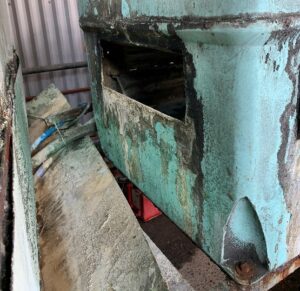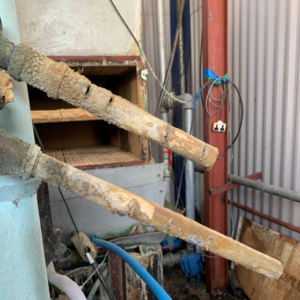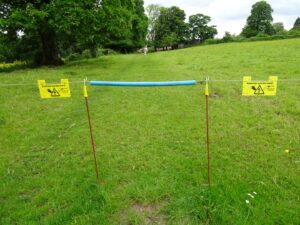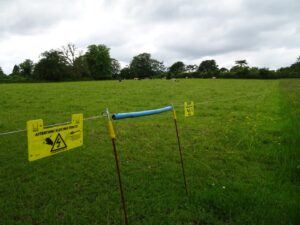Firm fined following outbreak of Legionnaires’ disease
A plastics manufacturing company in West Bromwich has been fined after it put workers and the public at risk of being infected with potentially deadly bacteria.
The Health and Safety Executive (HSE) investigated Riaar Plastics Limited after members of the public became infected with Legionnaire’s disease in September 2020.
Five people were infected with the potentially deadly lung infection. One person was taken to intensive care and put on a ventilator after being infected.
Riaar Plastics Limited was fined for failing to manage the risk of Legionella. HSE found the water-cooling towers inherited by Riaar Plastics Limited at its site on Black Lake, West Bromwich, were in an extremely poor condition. This allowed Legionella bacteria to grow in the water-cooling towers and pipes, exposing employees and members of the public to risks of significant ill health.


People can get Legionnaires’ disease when they breathe in small droplets of water in air that contains the Legionella bacteria. HSE guidance can be found at: Legionella and legionnaires’ disease – HSE.
Riaar Plastics Limited, of Black Lake, West Bromwich, West Midlands, pleaded guilty to breaching Section 2(1) and 3(1) of the Health and Safety at Work Act 1974. The company was fined £50,000 and ordered to pay £11,000 in costs at Birmingham Magistrates’ Court on 2 June 2023.
This prosecution was led by HSE principal inspector Jenny Skeldon and HSE senior enforcement lawyer Kiran Cassini.
HSE principal inspector Jenny Skeldon said: “The condition of the cooling towers at this site was the worst I had ever seen. The Legionella exposure risk to employees, site visitors, neighbouring duty holders and members of the public was extreme in nature.
“Exposure to Legionella can cause death or serious illness where water cooling systems are not been managed effectively. It is really important that proactive management of the risk from Legionella bacteria is taken seriously. There are well publicised and simple precautions for companies to take, and if followed, will ensure that employers manage and control the risk.”
Wiltshire land owner fined after public attacked by cows in two separate incidents
A Wiltshire landowner has been fined £15,000 after members of the public were seriously injured by cattle while walking along footpaths on his estate.
Sir Charles Hobhouse pleaded guilty to health and safety failings at his Monkton Farleigh Estate in Bradford-on-Avon.
It follows two separate incidents in summer 2021 in which people using public footpaths on his land were attacked by cows.
Retired military officer Michael Booley was walking his dogs with his wife Joanne and their friend Josian Gauld on 5 June 2021. They found the public right of way blocked by an electric fence and no alternative route provided. After carefully negotiating a fence to continue along the path, the trio were approached and attacked by several cows.
Mrs Booley suffered serious injuries including a fractured shoulder and broken ribs.

Mr Booley, 57, said the attack was ‘horrendous’ and that he felt ‘powerless’ to protect the pair from the aggressive herd.
“Experiencing battle as a solider is different to being attacked out in the countryside when on a leisure walk on a public right of way,” he said.
“I witnessed my wife being relentlessly stamped on and head butted by the cows and at one stage she was not responding.
“I also witnessed my friend desperately trying to find cover behind a tree and fighting the attacking cows with her rucksack as they attacked her from both sides.
“I still have nightmares about it.”
An investigation by the Health and Safety Executive (HSE) found Sir Charles Hobhouse had failed to ensure the risks to members of the public were controlled, including where possible, that cattle with calves were suitably segregated from the public footpath. HSE has advice for farmers, landowners and other livestock keepers on dealing with the risks posed by cows with calves.

Despite being formally instructed to implement controls to prevent a similar incident, a second attack occurred weeks later on 19 August 2021.
Local builder James Johnson was out for an early morning run with his dog along the footpath when he was attacked by cattle shortly after 6am.
“I remember the incident clearly,” the 42-year-old said.
“There were two groups of cows, one of which was running fast towards me and the other coming from a different direction.
“When I realised what was happening I let the dog go and started to run.
“The cattle ran into me and knocked me onto the ground, where I was trampled, pushed and head butted.
“Every time I attempted to get back up, they pushed me back down.
“Near the end, when I was exhausted and hurt, I fell to the ground one more time and remember thinking ‘this is it – this is where I die’.”

Mr Johnson sustained significant injuries including concussion, dislocated shoulders, broken ribs, and broken vertebrae. He was in hospital for several days. On this occasion there had been no measures to segregate the cows from the footpath.
Sir Charles Hobhouse pleaded guilty at Taunton Crown Court to breaching two counts of section 3(2) of the Health and Safety at Work etc Act 1974 on 3 May 2023. At a sentencing hearing at Bristol Crown Court on 8 June 2023 he was fined £15,000 and ordered to pay costs of £8,000.
HSE Inspector Leo Diez said: “Large animals can be a risk to people. Even a gentle knock from a cow can result in injury. Seemingly docile cattle can pose a risk to walkers when they are under stress or feel threatened and can exhibit instinctive maternal or aggressive behaviour.
“Where possible cows with calves should not be grazed in fields where there is a public right of way. Where this is not possible they should be segregated from the footpath by appropriate fencing where it is reasonable to do so.”
Bedding manufacturer fined £80,000 after machine operator loses fingers
A leading bedding manufacturer has been fined £80,000 after an employee suffered horrific injuries when his hand was drawn into a machine.
John Cotton Group Limited faced legal action following the incident on 9 December 2020 – which resulted in the machine operator having three fingers on their left hand amputated.
The incident occurred due to there being inadequate procedures in place to allow safe interventions with machinery.
The 36-year-old, from Wigan, had noticed a fault with the machine and in an attempt to resolve the issue, tried to power down the machine to allow access. However, the machine was still moving, and his left hand contacted dangerous moving parts.
Health and Safety Executive (HSE) Enforcement Lawyer Radha Vaithianathar told Manchester City Magistrates Court how the man’s fingers were partially severed by the machinery with the remainder having to be surgically amputated at hospital.
An investigation by HSE found John Cotton Group Limited, a leading manufacturer of bedding, had not made adequate arrangements to prevent access to dangerous moving parts of the machine. The company failed to provide a sufficiently robust procedure for powering down the machine to allow safe access. There was also inadequate training, monitoring and supervision of employees for dealing with problems with the machine.
John Cotton Group Limited, of Beaver Court, Lockett Road, Wigan pleaded guilty to breaching Section 2(1) and 33(1) of the Health & Safety at Work etc. act 1974. The company was fined £80,000 and was ordered to pay £4,989.05 costs at a hearing at Manchester City Magistrates Court on 5 June 2023.
After the hearing, HSE inspector Thomas Delroy said: “This severe injury could have been easily prevented and the risk should have been identified.”
“Employers should make sure they have a robust procedure for isolating machinery, and they have appropriate training, supervision and monitoring to ensure it is adhered to”
